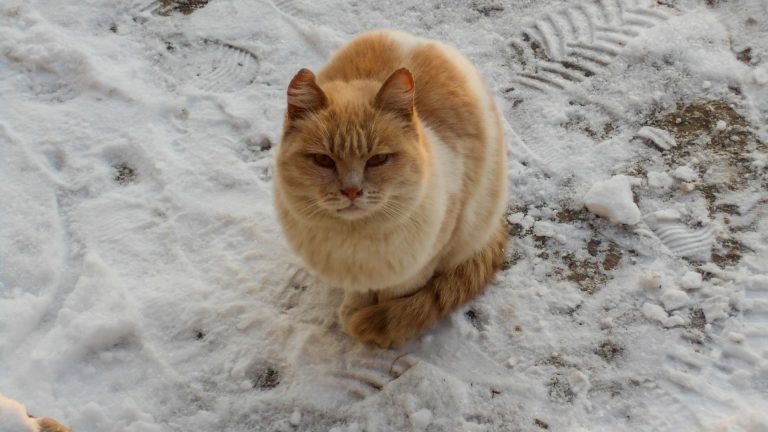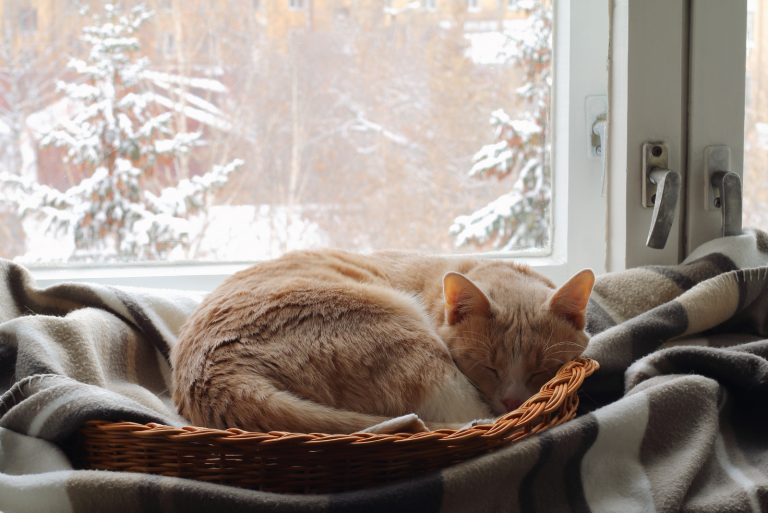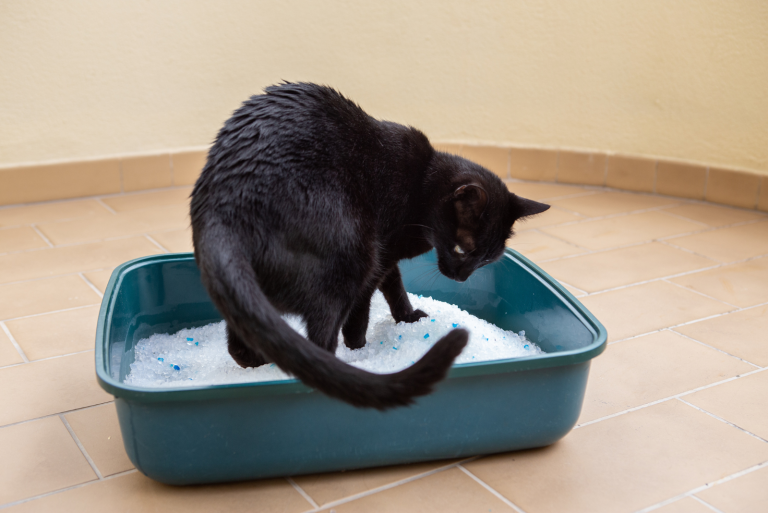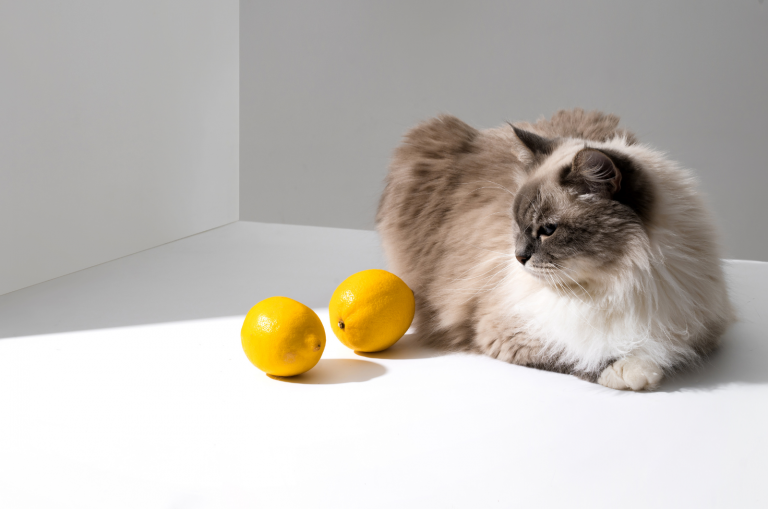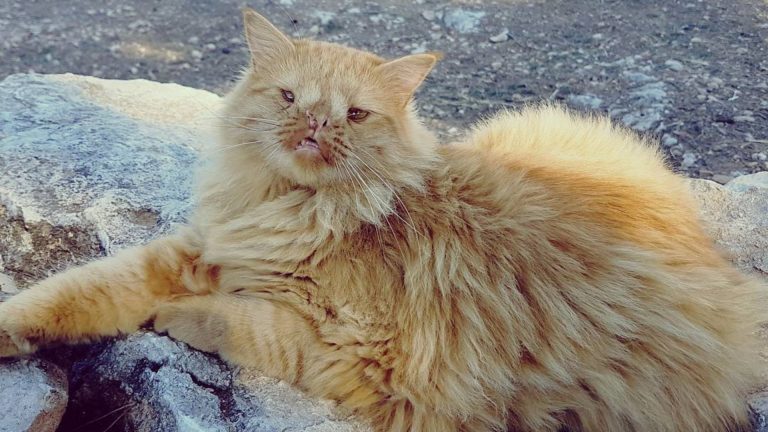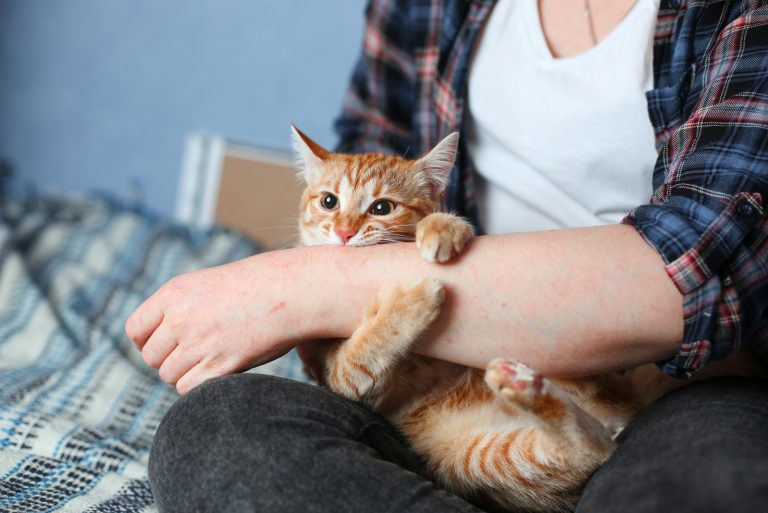Can Cats Have Autism? This Is What You Need To Know
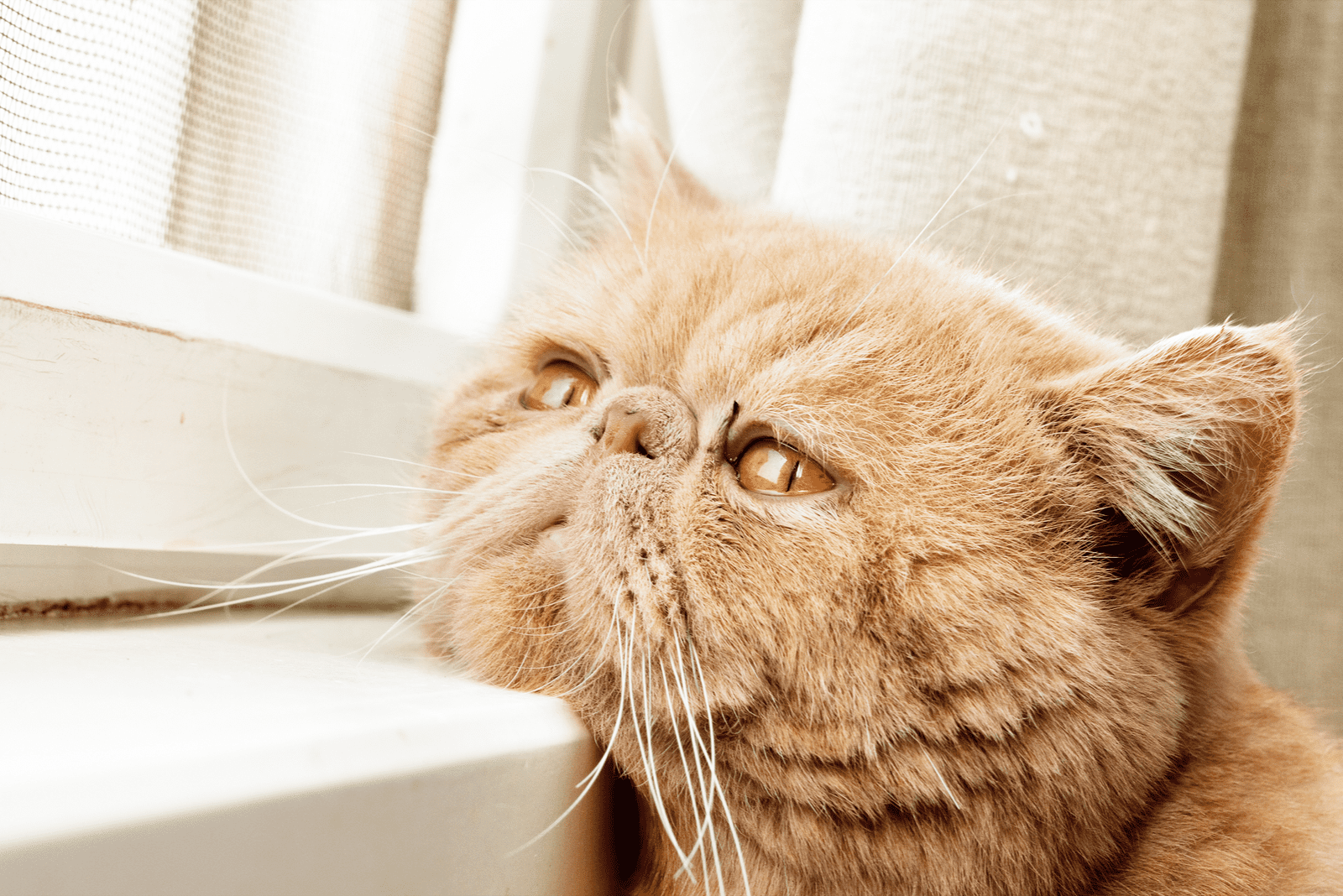
Cats are really interesting creatures whose odd behaviors sometimes really make us stop and think. I also think there’s beauty in that and that every cat is a small mystery in itself.
As a cat owner, you might have noticed your furry friend is exhibiting some …strange behaviors that resemble autistic behaviors. It’s natural that the following question comes to your mind – Can cats have autism? and Does my cat have autism?
So I’m going to put an end to your wondering – no, cats cannot have autism.
The thing about autism is that it is heavily researched only in humans and all other species are still left “uninvestigated” for the presence of autism. Cats cannot be labeled as autistic, as autism is only tied to humans.
Please continue reading to find out more about this interesting topic, find out what are some odd autism–like behaviors cats exhibit, as well as how cats are extremely helpful for autistic children!
Can Cats Have Autism?
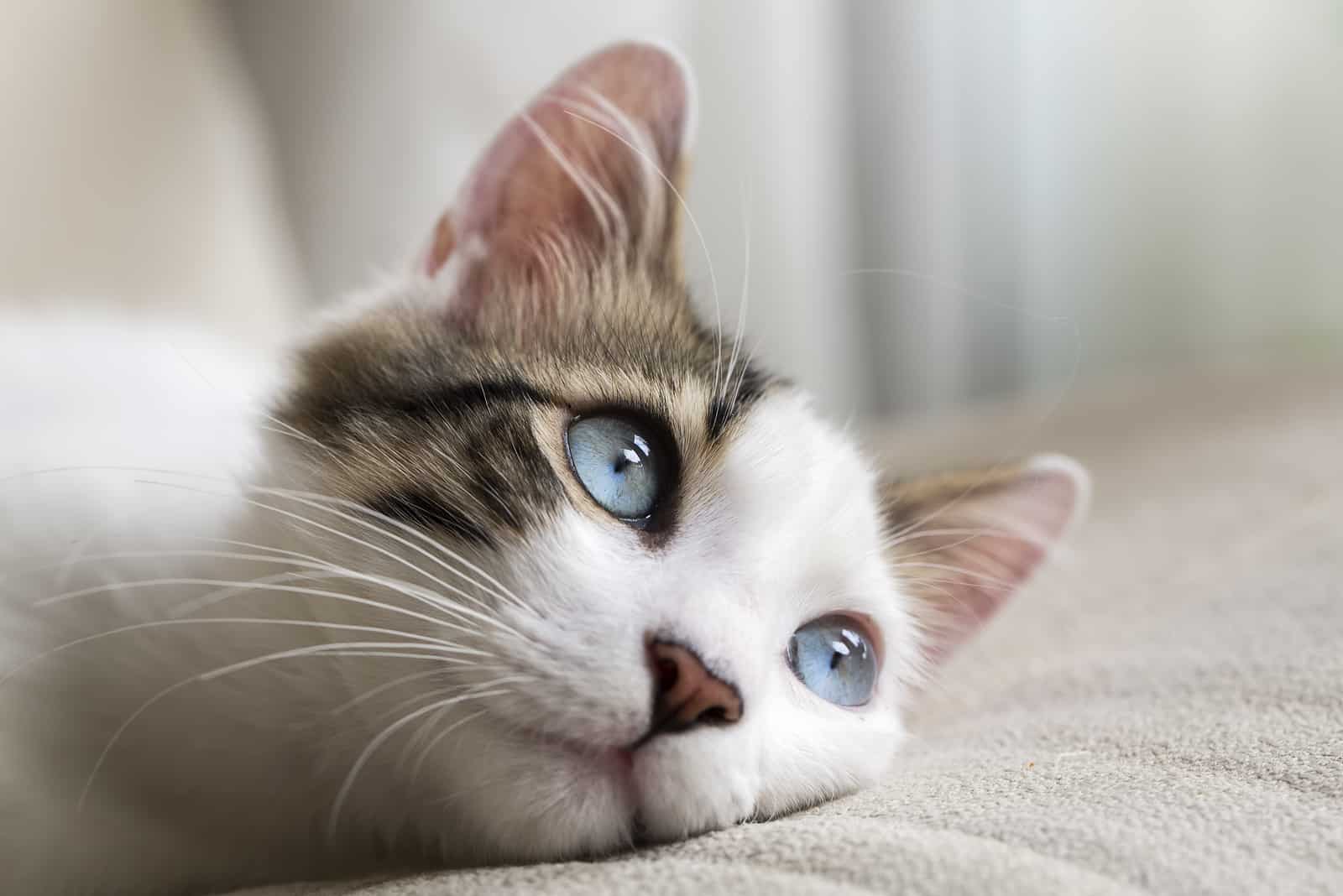
No, cats technically cannot have autism. Although some cats can exhibit behaviors that are extremely similar to behaviors characteristic for people with autism, we still cannot say a cat can have autism.
Is Science Making Any Progress Towards Answering This Question?
The research of animal’s mental health is not advanced and there aren’t even that many scientists focusing on this subject.
I would say it is completely understandable, considering how much about mental disorders in humans we don’t know. If we haven’t gotten to the bottom of autism (and similar conditions) in humans, we surely haven’t done sufficient research about mental disorders in animals.
But what we do know so far is that cats cannot have autism. This is not to say it is 100% impossible because nothing in science is 100% for sure. In a few years or decades, it might turn out to be untrue, but as far as we know – cats and autism aren’t correlated at any level.
What Is Autism?
Autism or autism spectrum disorder (ASD) is a lifelong condition that is characterized by an individual experiencing challenges in communication, interaction, repetitive behaviors, social skills, learning, and/or building relationships.
It is a complex developmental disorder or condition, but not an illness – which is very important to emphasize!
An autism diagnosis is not taken lightly. There is a set of autism diagnosis criteria that healthcare providers must obey in order to give someone a diagnosis as being autistic.
Is There A Cause Or A Cure?
The cause of it is unknown and there is no cure. It is diagnosed by performing specific tests and performing evaluations. Even though there is no cure, supportive therapy, such as behavioral and speech therapy, exist and are proven to increase the quality of life for autistic people.
Now, in order to fully understand autism and why some people see “autistic behaviors” in cats, let’s review autism clues in people. In this way, I believe it will help you see the similarity between autism in humans and some behaviors cats exhibit.
Why Did I List Human Autistic Behavior When We’re Talking About Cats?
Hopefully you’ve read what’s written above or at least skimmed through the headings. It was important to explain a bit about characteristic autism clues in humans due to the fact that some of these human autistic behaviors are just NORMAL feline behaviors.
But because some people have basic knowledge about autism–related behaviors, they tend to “see” them in cats as well.
But no – just because some of them are common in autistic people, it cannot be said that cats exhibiting them are autistic. They are simply normal for cats, even though they’re not ordinary for humans.
So, which behaviors am I talking about?
6 Cat Behaviors You Might Misinterpret As Autism In Cats
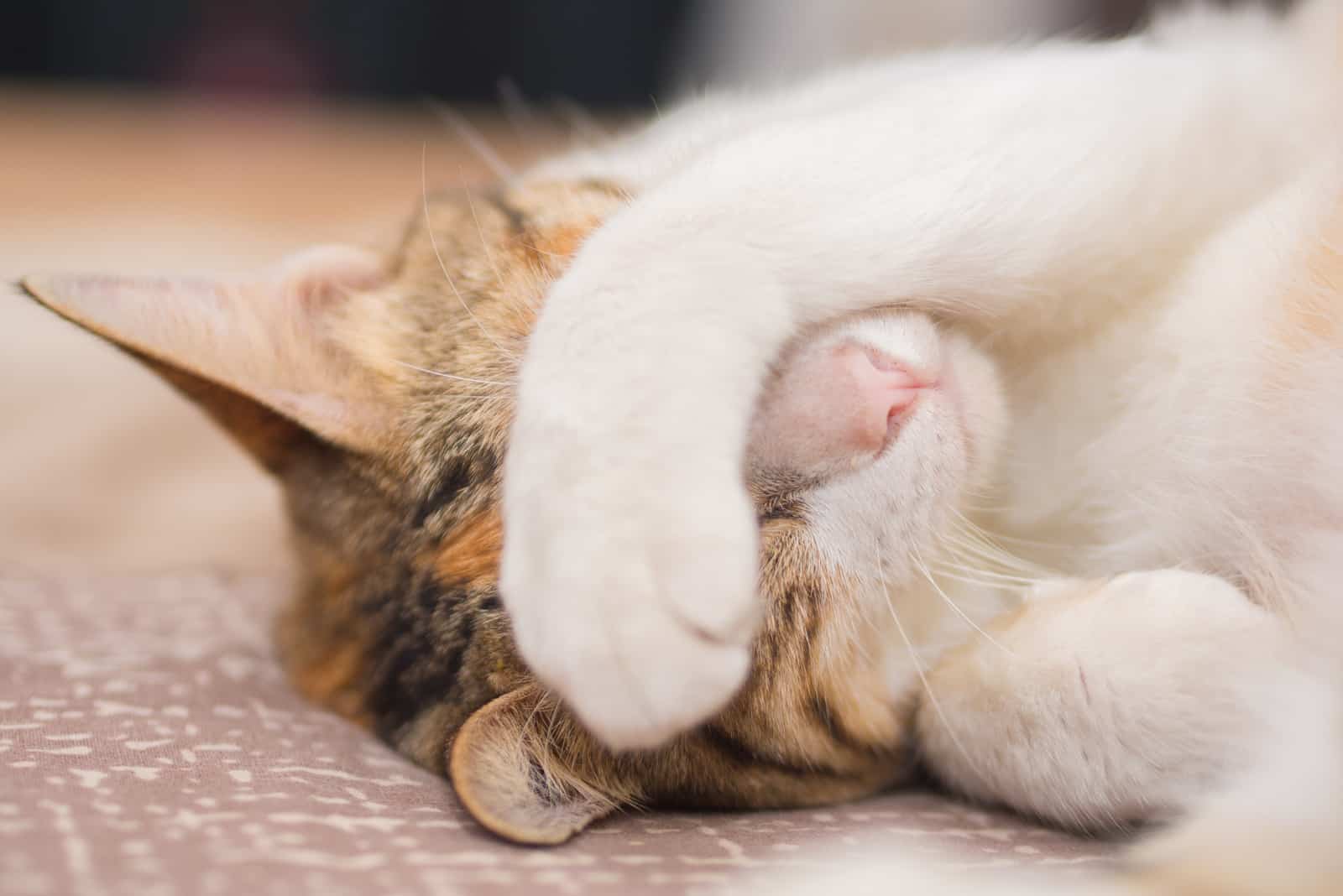
Let’s jump right into it!
1. Avoiding Eye Contact
For us humans, maintaining eye contact is a very important part of socializing and carrying out a normal conversation. Avoiding eye contact is a common sign of autism in humans.
But what does maintaining eye contact mean for cats? For cats, eye contact means one thing – a threat! Direct eye contact is a cat’s body language telling you or other cats “Back off!”. When two cats that don’t like each other come face to face – the first thing they do is stop and maintain direct eye contact.
Essentially, eye contact is associated with aggression and territorial behavior in the cat world. This is the reason why cats avoid eye contact – they associate it with not being friendly, so I am sure you understand why your cat does not not want to maintain long eye contact with you!
2.Exhibiting Compulsive Behaviors
If your cat is exhibiting compulsive behaviors, it is not a sign of autism. It is most likely a sign of feline obsessive compulsive disorder (OCD).
Some common compulsive behaviors are:
🐾 obsessive grooming
🐾• repetitive vocalization
🐾 repetitive pacing
🐾 chewing on fabric
So next time you notice a cat performing some repetitive acts, rest assured that it is not a sign of autism but rather something else. It can be a symptom of some disease (for example excessive scratching can indicate some skin disease) or it might be OCD.
3. Not Wanting To Socialize
I am sure you have noticed cats do not need your attention 24/7. They are known to be solitary creatures and that’s simply in their nature.
Of course, cats absolutely need social interaction. And not only do cats need it, cats actually want social interaction – they love playing around and making all kinds of mischief. But they are not dependent on it. Cats love having some alone time and just relaxing.
4. Sensory Sensitivity
A cat’s ears and eyes are much more sensitive than human’s. Because of that, cats are more sensitive to loud noises and very bright light. It does not hurt them, they’re simply sensitive to it.
Sensory sensitivity has nothing to do with cats being autistic, but rather the natural ability of their eyes and ears.
Essentially, if a noise is loud for you – it’s extra loud for your cat. And if a light is bright for you – it’s extra bright to your cat.
5. Not Wanting To Be Held Or Touched
Not wanting to be held or touched is not a trait that all cats share. It is relatively rare, but it is definitely possible for a cat to not want to be held or touched.
The reasons for that might be that a cat had bad experiences in the past when it comes to being touched and now associates it with bad emotion. Or a cat has some health issue that makes touching and being held painful
Whatever the reason might be, one thing is for sure – it is not because a cat is autistic.
6. Excessive Vocalization
Excessive vocalization is not a sign of autism. Some cat breeds, such as Oriental Shorthair or Siamese, are known to be very vocal by nature.
Your cat meowing, purring, or chirping regularly doesn’t mean anything out of the ordinary – cats do it when they feel like doing it!
Your cat’s meows and purrs can mean different things, such as:
🐾 a display of affection towards you
🐾 to greet you
🐾 to communicate with you or let you know something is wrong
What Might Be Causing My Cat Act Strange?
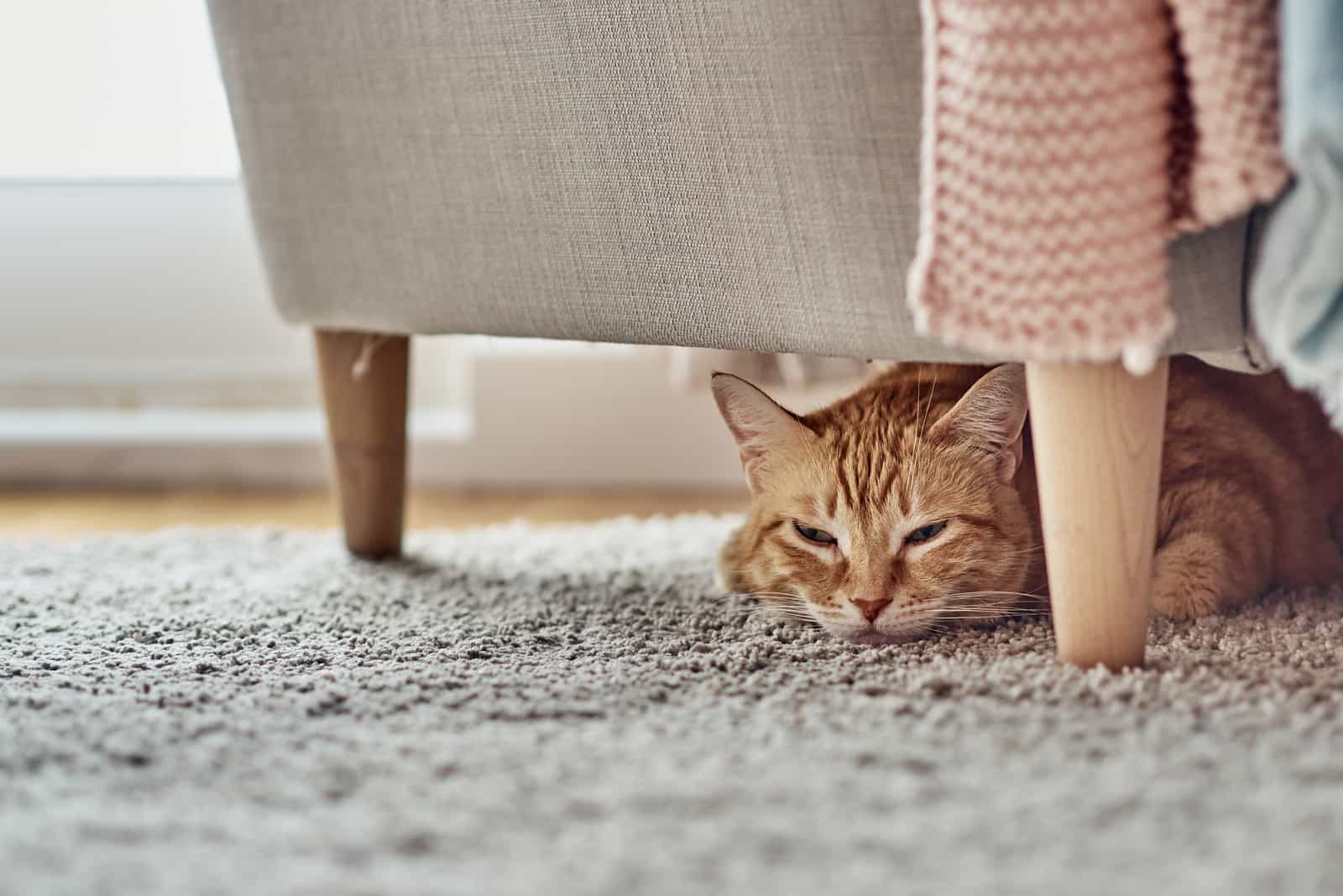
So even though I’ve said that cats avoiding eye contact, showing compulsive behavior, not wanting to socialize or be held, having sensory sensitivity, and meowing often can be considered as normal cat-behaviors, there is always a limit.
What do I mean by that?
It’s okay if your cat doesn’t want to cuddle 24/7, but if your cat does not allow you to touch them even for a second – that might be an issue.
If your cat is meowing repetitively, that can be normal, but if your cat is meowing constantly – that might be an issue.
Essentially, there is a “normal amount” of everything. But if you observe your cat acting very out of the ordinary – maybe a quick visit to the vet may ease your mind and help your cat with their potential health issues or mental disabilities.
How Do I Deal With My Cat’s Odd Behavior?
Well, I am going to be completely honest with you here – you need to simply accept it as normal, because it really is normal (in most cases).
Your cat not wanting to be cuddled all day cannot be considered as “odd behavior”. Nor is your cat not wanting to listen to loud banging rock music “odd behavior” – It is simply the way cats are.
There are some things they enjoy doing while hating others, and it’s the same with people, right? You just need to accept it and deal with it the best you can.
But I also have something important to add – there are boundaries when it comes to your cat’s strange behavior. If your cat:
🐾 becomes overly sensitive to light and noise,
🐾 starts constantly meowing,
🐾 stops wanting to be touched at all,
🐾 stops wanting to communicate with you or other pets in any way,
that might be a sign your cat is having some health issue. You, as a cat owner, will surely recognize when these odd behaviors become a sign something else might be happening. If that’s the case, I highly suggest a quick check up at your local vet.
6 Autism Clues In Humans That Are Observable In Some Cats

Symptoms of autistic spectrum disorder can start to show in early childhood, but in some cases they show much later.
A couple of key traits of autistic humans are (and they are not listed in any particular order, the numbers are there only to help organize information):
1. Not Maintaining Eye Contact
Problems with communication are usually one of the first ones to be observed.
The most common symptom is not being able to maintain eye contact and not being able to understand body language or use their body language to express how they’re feeling.
Cats also do not maintain eye contact, so this is a similarity between cats and autistic people and the reason some might think cats have autism.
2. Displaying Repetitive Behaviors
Repetitive movements and behaviors are also a major symptom of autism. Many autistic people show some pattern of repetitiveness, such as some specific hand movement, repeating some words, lining objects in a strict order and following a specific daily routine.
Cats also display repetitive behaviors, but for them – it might be a sign of OCD.
3. Difficulty Adjusting To A New Environment
Having a steady daily routine plays a big part in any autistic person’s life. It keeps them calm and prevents any anxiety.
It is very common for them to get upset when they’re found in a new environment with new people and new stimuli. That might make them feel uncomfortable and lead to stress. Of course, this can be avoided by maintaining a daily routine.
The same goes for cats – cats don’t like changing environments because they’re creatures of habit. For example, cat needs some time to adjust to a new home after a move and it’s because they don’t like new environments that much.
4. Challenges In Socializing
Anti-social behavior is another common characteristic of the autistic disorder. It manifests in a number of ways, but the lack of social skills is a prominent characteristic.
Also, some autistic people simply like being alone and appreciate their privacy.
Some cats also don’t like a lot of people in the house or getting to know new cats. They may also value their alone time more than anything else. So I do see a similarity between this characteristic of autism and the way some cats are.
5. Not Liking Loud Noises And Bright Lights
People with autism have difficulty processing external stimuli, such as:
🐾 sound
🐾 light
🐾 smell
🐾 taste
Some people can be hypersensitive (overly sensitive), while others can be hyposensitive (not sensitive enough). Autistic people being overstimulated is more common. Essentially, they have a difficult time understanding and processing loud noises and bright lights.
Well, the same goes for cats, as I mentioned earlier in the article: they also don’t like loud noises and bright lights.
6. Avoiding Physical Contact
A significant number of autistic people show discomfort when being touched. It is, of course, not a rule, but it’s a very common characteristic of autistic disorder.
Some cats also don’t like being touched, held, or cuddled all the time.
Cats Helping Autistic Children – It’s Possible!
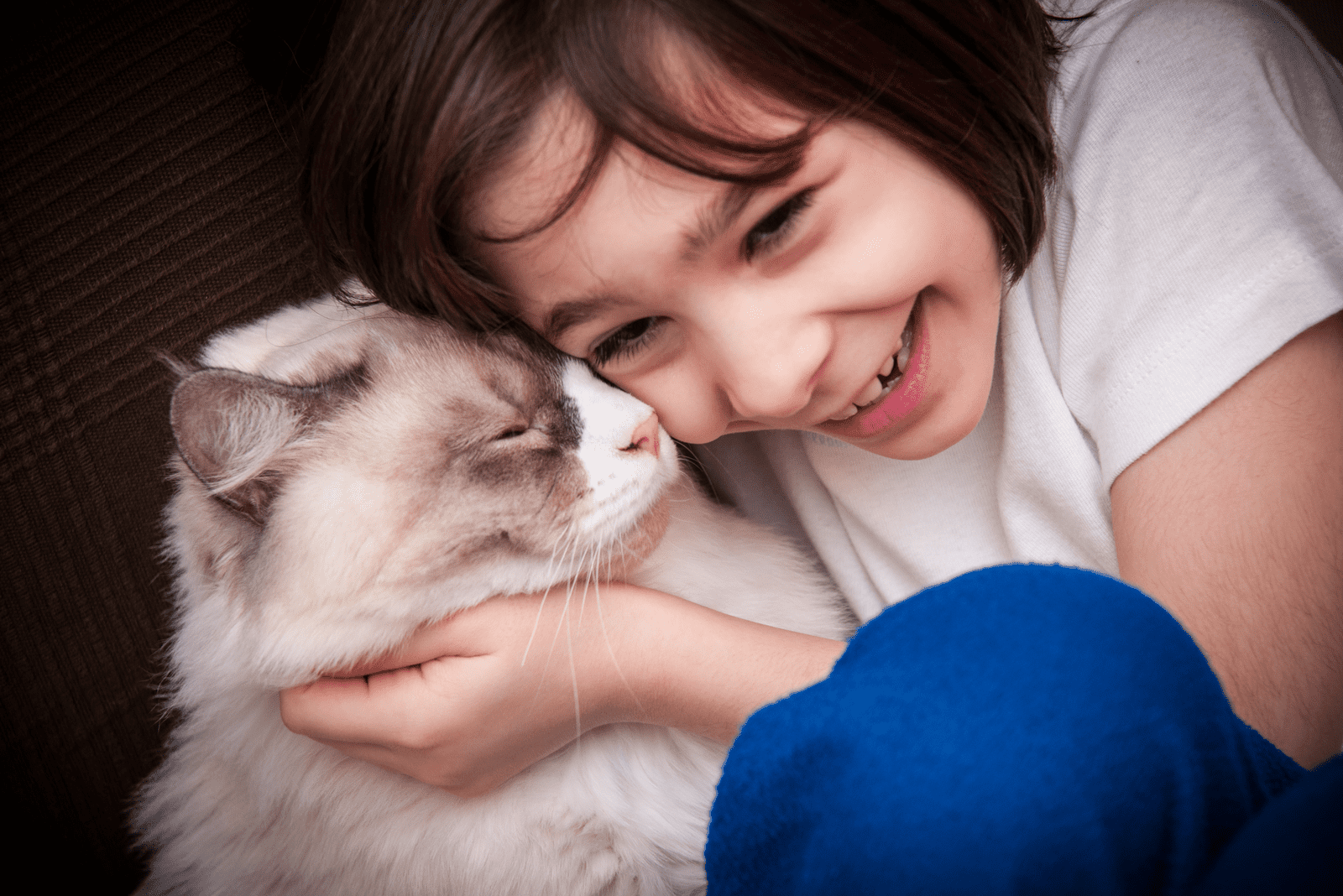
Pets helping children with autism might not be something you’ve heard of before, but it is certainly true and it’s happening as you’re reading this article!
As you might already know, autism cannot be cured. The only thing parents of autistic children can do is help them enjoy life as much as they can. One way to do so is by getting them a pet.
Not every autistic kid likes to interact with animals. And there are no rules – some kids simply love animals while others absolutely hate them. It all depends on the child itself, as every child is uniquely different.
The answer to Can cats be autistic? is – no, but cats can surely help autistic children and make their life better in some way.
How Can A Cat Help An Autistic Child?
A cat, as any other pet, can help autistic kids do the following:
🐾 help the child learn how to trust
🐾 teach them compassion
🐾 show them loyalty
🐾 help them make bonds with other people
🐾 reduce their anxiety and stress
🐾 encourage independence
🐾 teach them how to have empathy and care for something
🐾 as well as many other things not listed here
Which Cat Breed Is The Best At Helping?
There is not one definitive answer, but there are a couple of cat breeds that sort of stand out from all others, and those are:
🐾 Birman
Birman cats are famous for being extremely gentle, loving, and loyal. They absolutely adore their owners and other family members and they quickly form strong bonds with them. They enjoy cuddling and are known to be amazing with kids. Their patience and tolerance are great traits that enable them to be a great fit for many autistic children.
🐾 Maine Coon
Maine Coons are said to have “dog–like behavior” and that’s due to their trait of being very loyal, affectionate, and trainable. They are known for their large size and they’re often called Gentle Giants. They have great social skills and are very intelligent. They easily adapt, have great tempers, and approach kids with great care, which works great for autistic children.
🐾 Abyssinian
If a child is very playful and full of energy, then the Abyssinian might be the perfect fit for them! This cat breed is known to be very fun–loving and explorative. They love to play and, if the child is the same, they will be great friends. They treat kids and other pets very kindly so they are a nice fit if you have a “busy house”. But keep in mind that Abyssinians might not be the right choice for very calm kids that do not like too much interaction – Abyssinian cats are opposite to that.
🐾 Ragdoll
Ragdoll cats are great and loyal companions that will have enormous amounts of patience for an autistic child. They also absolutely love cuddling and will be an amazing life–long friend.
They are relaxed, easy–going and calm which perfectly suits some kids. You might notice that this is completely opposite to the Abyssinian cats, which are very energetic. In this case, Ragdoll cats are great for autistic kids that are not so high in energy and prefer relaxing rather than playing around all day.
But Does The Cat Breed Really Matter?
At the end of the day, a cat’s breed does not matter – the cat’s personality does. The list I provided is not to say any other cat breeds or mixed breed cats cannot work well with the child. Maybe a stray cat from the shelter can be a much better fit for a child than an expensive purebred cat.
The most important thing is that the cat and the child get along nicely and that the cat responds well to the child’s needs.
Age Of The Cat Matters
The most important thing about all cat breeds is their age.
Adult cats are much better at interacting with autistic children. You might wonder Why and the answer is surprisingly simple – younger cats and kittens like to “play it rough”. They are extremely playful (maybe even too playful) and love scratching and biting everything around them.
That does not sit well with many cat owners, let alone kids that might not understand why a cute kitty has decided to scratch and bite them.
Frequently Asked Questions
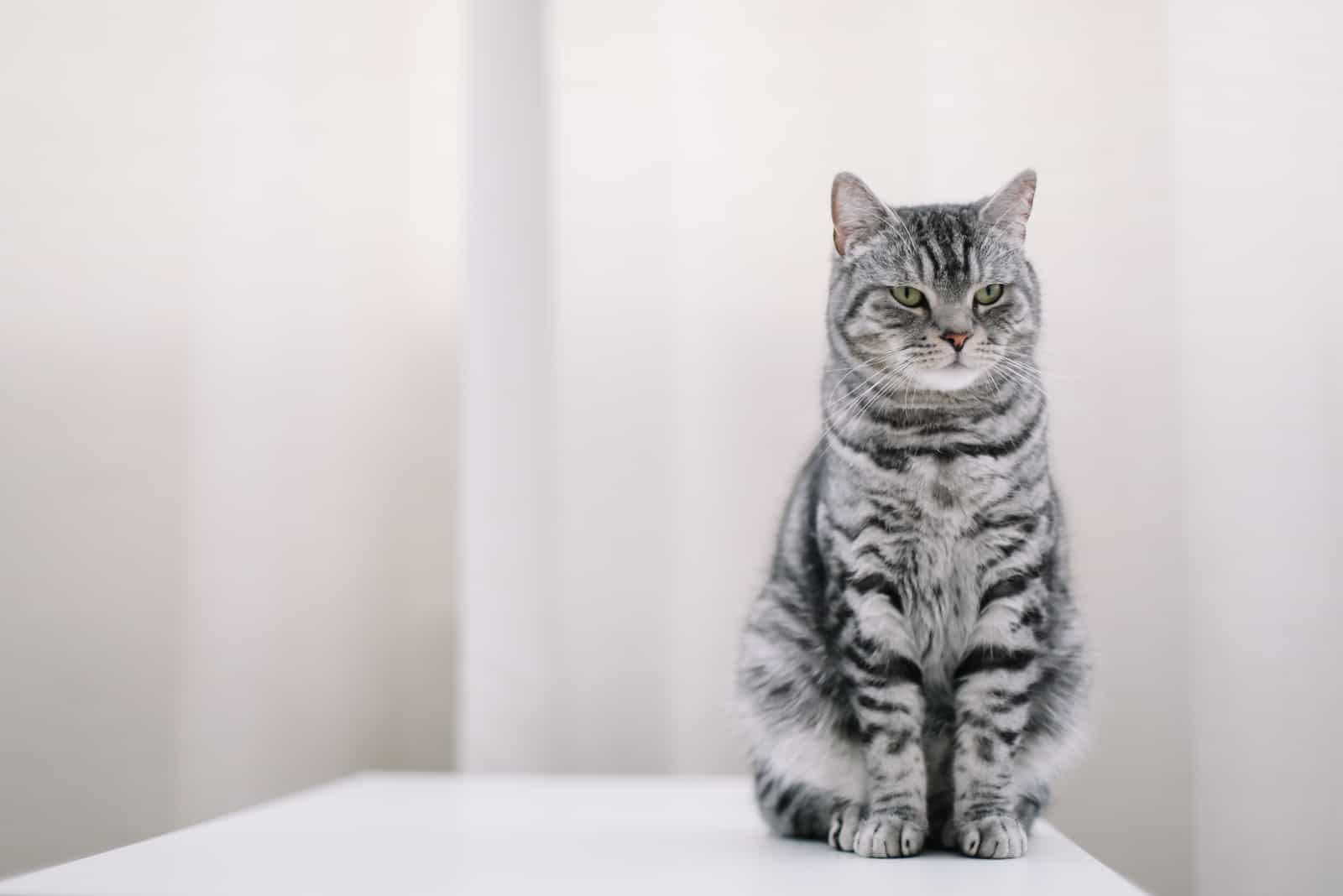
Is It Possible For A Cat To Be Autistic?
It is not possible for a cat to be diagnosed as autistic. So far, no scientific studies have proven a correlation between cats and autism.
Do All Cats Have A Form Of Autism?
There is a book by Kathy Hoopmann named “All Cats Are On The Autism Spectrum”. But many people have never actually read the book – they’ve just read the title. If you go over the introduction to the book or a simple book review, you will see that the book doesn’t actually talk about cats having autism at all.
This book talks about what it’s like raising a child on the autism spectrum. But the inspiration to describe it comes from the feline world. Many people love this book because of this playful approach to such a delicate topic. But no, all cats do not have a form of autism –- it’s just the name of a popular book.
Do All Cats Have Asperger’s Syndrome?
Kathy Hoopmann also has a book called “All Cats Have Asperger Symptome”. And the same as for the book about cats and autism – it is just the title of a book. The book aims to educate people about Asperger syndrome in an unconventional way by using …cats. It shows the correlation between some specific cat behaviors and behaviors people with Asperger’s syndrome display.
This writer also has a book named “All Dogs Have ADHD”. And I am sure you can answer this: Do all dogs really have ADHD? and What is the book about? You’re smart – I’m sure you’ve got this in a bag.
Can Animals Be Autistic?
Animals cannot be autistic as autism is correlated with humans only. The same goes with Down syndrome – it is a condition correlated with humans only!
Yes, animals can display autism–like and down syndrome–like traits, but they cannot have those two conditions diagnosed. A good example are dogs that exhibit symptoms almost identical to human autism. But, vets avoid calling it canine autism, but rather canine dysfunctional behavior.
What Are The Symptoms Of Autism In Cats?
Cats cannot have autism, but cats do exhibit some autism–like behaviors characteristic for human beings. But in most cases, those behaviors are actually …just normal cat behaviors!
Your cat doesn’t like to cuddle? Well, it doesn’t mean it has feline autism, because this trait is a regular trait for many cats. And there are a lot of other examples too (which I’ve mentioned above) so to conclude: behaviors some people consider as “clues of autism” are just normal cat behaviors in most cases. In some extreme cases, they can mean your cat is dealing with an underlying health issue.
Final Thoughts
Our little furry friends surely do act strange sometimes. The “Odd behavior list” I keep in my head is quite a long one, I must say. It’s also important to note that cats can have mental and physical disabilities that result in the display of some odd behaviors.
But it’s important to know which cat behaviors are odd, and which ones are simply …normal feline behaviors.
You might know a little bit (or a lot) about autism and know how to recognize signs of it. But human autism signs cannot be translated to cat behavior. That is because autism–associated behavior is normal cat behavior most of the time.
There have been no scientific studies that show any correlation between cats and autism, so the answer to Can cats have autism is – no, they cannot.
If you were worried even the slightest bit about your feline friend possibly having autism, I hope I have cleared everything up! Now, stop worrying and go spend some time with your cat!
See Also:
Do Cats With Down Syndrome Exist? A Popular Misconception

